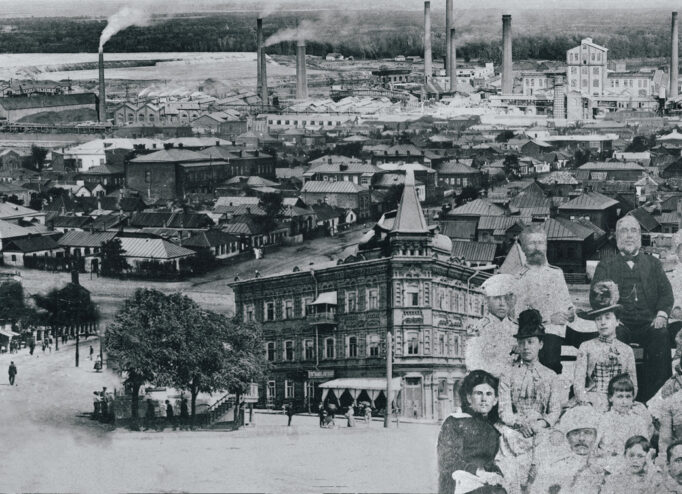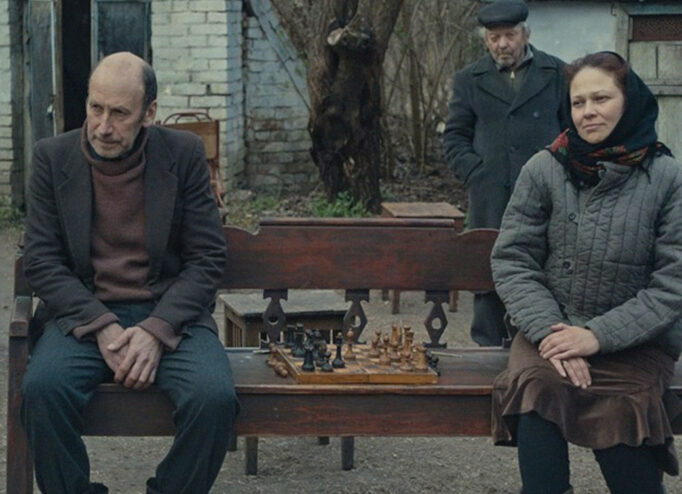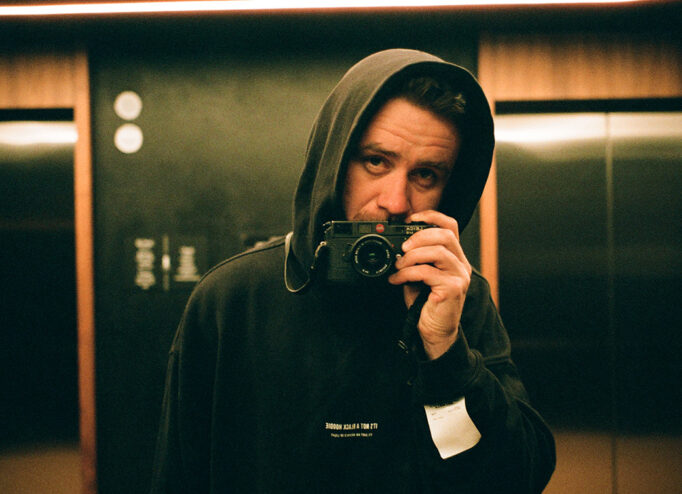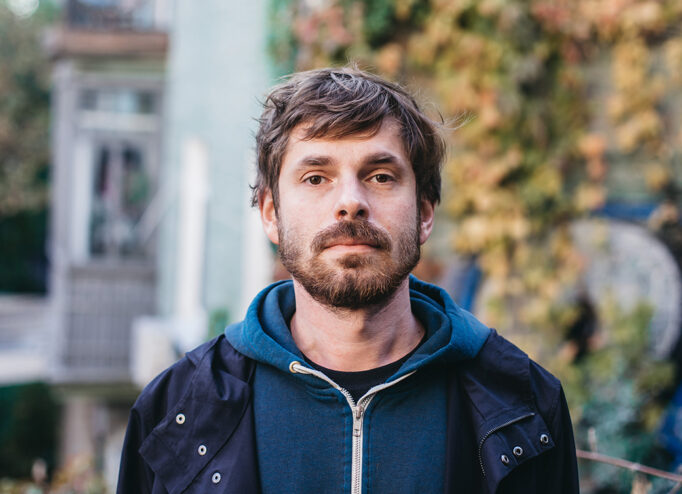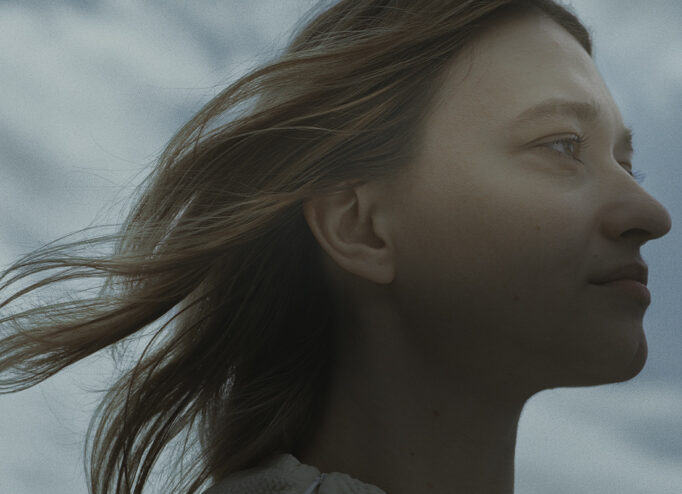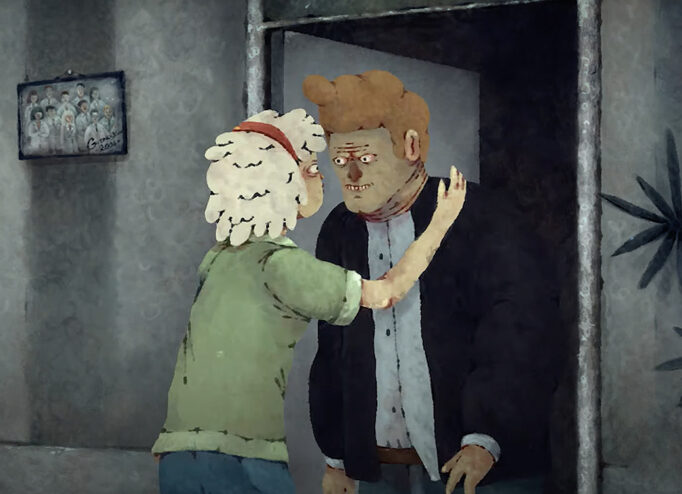Revolution, war, captivity and emigration are the main themes of Tabor Production, which has formed a community of like-minded filmmakers around itself. The association was founded ten years ago in Odesa by directors Maksym Nakonechnyi, Alina Gorlova and Yelizaveta Smith. During this time the team has made 12 films about Ukraine: documentaries and feature films, full-length and short films. The team shows how the country is changing at certain stages of its maturation through the experience of its characters.
The aesthetics of the frame and the moral framework of working with characters are equally important for Tabor: that is why the association’s films can be recognized by their meticulous and unhurried depiction of locations and events, as well as by their delicate work with people in the frame. Some of their films have won awards at key international film festivals and even made the list of the best films in the history of Ukrainian cinema, while some of them were recognized only with time.
DTF Magazine tells about 12 films by Tabor Production, which introduces Ukraine through the stories of children, migrants, heroes and people traumatized by war and not only people. And also about four upcoming Tabor films, including a new work by the director of ‘Pamfir’, Dmytro Sukholytkyi-Sobchuk
Briefly about Tabor Production
Tabor Production was founded in Odesa in 2013. The company first loudly announced itself in 2017 with the victory of the film ‘School №3’ by Yelizaveta Smith in the Generation 14Plus section at the Berlinale. In the 10 years since, the production team has won at film festivals in Florence, Leipzig and Amsterdam. They also managed to present ‘Butterfly Vision’ in the Un Certain Regard section at the 2022 Cannes Film Festival during the full-scale invasion. They discovered actress Rita Burkovska (‘Butterfly Vision’), cinematographer Vyacheslav Tsvetkov (‘This Rain Will Never Stop’) and director Nikita Zarkh (‘Black Dog’) in Ukrainian cinema. And Gorlova’s ‘No Obvious Signs’ is included in the list of the 100 best films in the history of Ukrainian cinema.
1.
Grandma, 2014
Directed by Alina Gorlova
Short film
The very first and shortest film by Tabor is devoid of a traditional plot, but the symbols make it easy to decipher the film. Grandma bakes cookies in the oven, pours milk into glasses, and sits alone at the table hearing the cries of children who are not in the house. A barely legible video is shown on the TV near the table, where the subtitles hint at a sad ending: ‘Once it happened and then the guest could not bear it and shot himself’.
Gorlova builds a unique world with almost AMSR sound and the feeling of scratched film in her movie about loneliness in old age. There’s also references to famous artists.
The director makes an homage to ‘Arrangement in Grey and Black: The Artist’s Mother’ by James Whistler in one shot — the plot of the film about Mr. Bean revolved around this painting. But here, the change to a close-up of the heroine’s face dictates a completely non-comedic tone. Through Grandma, Alina Gorlova creates an image of an abandoned mother, which strikes the audience with its variety of forms, despite the limited duration of the film.
2.
Kholodny Yar. Intro, 2016
Directed by Alina Gorlova
Full-length film
What is Kholodny Yar? It is a place of strength, where the Kholodny Yar Sich with partisan movement was first organized. Today, the history of the rebel movement, which continues to this day, is spread out in this tract with a system of ravines. Kholodny Yar is also a cinematic place, which Alina Gorlova looked at in a new way in her documentary. Her film consists of a mosaic of history, testimonies and observations of the local landscape. The color of the image, as if it had been pulled out of the ground, only adds to the immersiveness.
If earlier some facts about Kholodny Yar seemed contradictory, such as the consecration of weapons by the Orthodox Church, today this ritual is already acquiring more understandable and acceptable meanings. And Gorlova’s camera captures the renewed traditions and the heroes’ attraction to this land.
And the main character of the film ‘Petro the Tsymbalist’ (it will be released only a year after this film) Skazkiv wrote the music for ‘Kholodny Yar. Intro’.
3.
Invisible, 2017
Directed by Maksym Nakonechnyi
Short film
In class, a teacher reads a passage from Mikhail Bulgakov’s novel to the students, and then asks one of the hooligan students to stand up. He makes a vulgar joke about his erect penis, which causes the teacher to run home in shame at the end of the lesson. At home, she fails to masturbate in the bathroom, so she buys a bottle of vodka at the store to relax. Then the director creates a surreal story in the style of Nikolai Gogol, in which the protagonist (a liberated Daria Melnyk) runs naked through the village, annoying the locals.
Nakonechnyi’s debut is worth a look, especially before watching the feature-length ‘Butterfly Vision’, because if you watch these films in turn, it becomes clear why the director explores psychological traumas through female characters. Both films deal with the silence and prohibition of topics of psychological and sexual violence in society, and through the films Maksym tries to highlight the non-obvious problems that women face: from public condemnation for their choices to sexualization and stereotyping.
4.
Petro the Tsymbalist, 2017
Directed by Yelizaveta Smith
Full-length film
‘Our strength is in the truth, — Petro Skazkiv, a cimbalist from Vorokhta, says on camera at Maidan in 20144. — What is our advantage? We don’t have weapons. We have the truth. We stand here for justice, so our position is much stronger than theirs’. The charismatic Petro occupies almost the entire space of Yelizaveta Smith’s debut film, traveling around Ukraine and playing a stringed percussion instrument.
You can see how with this film the Tabor team learns to watch their character without preventing him from being himself in the frame.
Perhaps that’s why there is no recognizable image of Petro in the film, thanks to which he is remembered from the TV show ‘Ukraine’s Got Talent’ (Ukrayina maye talant). In Smith’s film, he is presented as a sincere guy who dreams of people’s understanding in Ukraine, accessibility of education and victory in the war that started after Maidan. And also it is not only a portrait film about Petro, who died of lung cancer in 2021, but also a memorial film about a talented musician who mastered the art of playing the tsymbaly.
5.
School №3, 2017
Directed by Yelizaveta Smith and Georg Genoux
Full-length film
In 2014, a school in Mykolaivka, Donetsk region, was damaged by strikes by pro-russian militants. These events had an emotional impact on the school’s students, who in their monologues in front of the camera talk about love, problems and even war-related traumas. Sometimes the filmmakers give the image to their characters and the viewer observes the lives of the schoolchildren from the inside when, in particular, one of the students walks around the courtyard talking about amusements and films it. Over the course of two hours, the viewer learns that war is not only something that describes the characters in the film, but something that affects them. And to a lesser extent than school fads.
‘School №3’ opened the way for Ukrainians at the Berlinale Film Festival with films about teenagers from the frontline territories. Since then, similar films have been released annually in the Generation 14+ section (Taras Tomenko’s ‘Boney Piles’ and Alisa Kovalenko’s ‘We Will Not Fade Away’).
However, apart from the main opening of this section by Ukrainians, the directors managed to win the Grand Prix and 7500 EUR, part of which went to grants for social and cultural projects in Mykolayivka.
6.
New Year With Family, 2018
Directed by Maksym Nakonechnyi
Short film
The events of Nakonechnyi’s second short film take place on New Year’s Eve. A man and a woman are shopping in a supermarket for the holiday, and they have a conflict over the high price of pork tongue. Subsequently, they are passive aggressive with each other at the checkout because they are short of money, and finally the climax of the film comes at midnight when the water pipe breaks under the kitchen sink. Along with it, the images of the main characters also break down and reveal themselves. The fireworks outside make the terrified son hide under the table, and this tells the viewer that this is a family of immigrants from the east. The film is perceived differently after the fireworks scene, because it is not a film about New Year’s Eve, but about a new home — often uncomfortable and inconvenient.
The film traces a delicate work with the theme and characters. ‘New Year With Family’ confirms this rule in the language issue — the main characters try to communicate in broken Ukrainian, but it does not pass through the filter of humor.
In contrast, Nakonechnyi films a slightly naive but heartfelt story about how we create a domesticity in which triggers are soothed by reading the tale of the Moomins.
7.
No Obvious Signs, 2018
Directed by Alina Gorlova
Full-length film
Oksana Yakubova, deputy battalion commander for work with personnel, returned home from war and switched to an office job, although she is still connected with military affairs. Her PTSD still interferes with her life, not only when she encounters traumatic information, but also on her way from home to work. Alina Gorlova politely captures her changes, showing that it is not possible to avoid war even in civilian life.
It was this film that widely opened the creativity of the Tabor Production team to the viewer, because in 2018, through the challenges of the military, they introduced the audience to new Ukrainian cinema, which began to be released more often in cinemas.
The ironic (maybe even evil) title of the film ‘No Obvious Signs’ emphasizes the attitude of the medical field towards traumatized military personnel. Today this film hits the reality even more painfully, because there has not been a single reform of the military medical commission, which would have been able to release already mobilized guys from service because of numerous injuries received at the front.
8.
Solitude, 2019
Directed by Yelizaveta Smith
Short film
A storm on the sea brought to the city beach the bomb from the Second World War. This becomes a reason to evacuate the inhabitants of the town, so they announce a gathering at the theater. A lonely forty-year-old woman comes there and meets a stagehand, and their acquaintance will help both of them to get rid of their isolation from the world.
When Solitude was presented on the festival circuit, it was not immediately popular in Ukraine. It seemed incomprehensible because of Yelizaveta Smith’s complex visual language, but with time this film opened up from a new perspective.
In a time of full-scale invasion, this short film helps to comprehend the mixture of feelings during the anxiety reflected on the faces of the main characters. Plus, the aerial bomb brilliantly signals the sense of danger the entire country will face three years later in reality.
9.
As Far As Possible, 2021
Directed by Ganna Iaroshevych
Full-length film
Michel moved from Germany to swap his business suits for the clothes of a Ukrainian cowboy. He has buffaloes in the western regions and feels in his place. Besides, he has fallen in love with Vera, whom he wants to take with him far away from his homeland, although she prefers to stay in a comfortable European country. However, Michel’s vocation to save the buffaloes from extinction may be stronger than love.
Director Ganna Iaroshevych finds duality in a foreigner who cannot choose between love in his native land and a longing for the wilderness of the Carpathians. This conflict is aggravated by Vera’s unwillingness to raise two children in a remote village, and the family business in Germany is collapsing because Michel doesn’t pay enough attention to it.
The added value of this film is somewhere in the middle between the humorous intonations of the eccentric Michel and already familiar to us depictions of how Ukrainian culture and nature take over ‘westerns’.
10.
This Rain Will Never Stop, 2021
Directed by Alina Gorlova
Full-length film
In a stylish black-and-white film, Gorlova explores the cyclical and oppressive nature of war in the life of Red Cross volunteer Andriy Suleyman. In 2014, he faced a russian invasion in Starobilsk, Luhansk region, where he had moved from his native Syria. But misfortunes never come singly, and his father dies in Ukraine. And that means he must be buried according to Muslim traditions in Syria.
This is an adult work of Tabor Production, which, despite many topical themes, shows pain and despondency not only because of the protagonist, but also because of nature, which is almost the main character here.
Andriy feels different emotional states: from the joy of being a volunteer to mourning the death of a loved one. He lives in Ukraine during the Independence Day parade, in Syria during his father’s funeral and in Germany during Pride.
For Tabor, ‘This Rain…’ is one of the most awarded films. At the IDFA festival in Amsterdam, it won the award in the First Appearance competition, and at the Florence Festival dei Popoli — the award for the best feature-length documentary. The Ukrainian premiere took place at Docudays UA, where the film won the Current Time Award.
11.
Butterfly vision, 2022
Directed by Maksym Nakonechnyi
Full-length film
Maksym Nakonechnyi’s debut feature film and Tabor’s first feature-length fiction film, telling the story of Lilia, an aerial reconnaissance expert, raped in russian captivity during the war in eastern Ukraine. Upon her return to home, she tries to continue living with the tragedy, but loses communication with her lover and finds no support among her close ones.
Nakonechnyi made the film with volunteers, doctors and former POWs in supporting roles, and the film was created near the war zone.
Due to the fact that the film was made very realistic, a unique world was created in which the heroine’s inner conflict becomes apparent in the best tradition of the films ‘Rozetta’ (1999) and ‘Winter’s Bone’ (2010).
12.
Black Dog, 2022
Directed by Nikita Zarkh
Short film
One of the two films, that was not made by the trio of Nakonechnyi — Gorlova — Smith, differs from the films by Tabor thematically, because it has no time-based events. But in it you can recognize Ukraine with tired construction workers, among whom Leva stands out because he writes poetry and dreams of a university education. His colleague invites Leva to the village, where the protagonist reads poems to local people and drinks with them. But the uncomfortable truth about Leva’s sexual identity comes out at the end of the film and it makes us look at the story from a new angle.
The black dog that chases Leva around the field and later becomes his loyal friend turns into a metaphor for the deceptive moment of intimacy.
The first contact between the construction workers, where one washes the dirt off the other’s body with water, shows how varied and rich the symbolism and sexual subtext are presented in the film.
The protagonist prepares to reveal the secret, but does not yet know what kind of blow or kiss his partner will ‘thank’ him with. In the context of Tabor’s filmography, ‘Black Dog’ shows a broader view of the rights of the LGBTQ+ community and reveals the fact that negative attitudes towards this community persist.
4 future films by Tabor Production
1.
Listening to the World
Directed by Yelizaveta Smith
Full-length film
This is the story of art curator and activist Iva, unable to hear because of her disability, and her 15-year-old son Mykyta, who, after a full-scale invasion, hid in the Kharkiv subway for a week. When they manage to evacuate to Berlin, Iva gets the chance to hear her son’s voice for the first time because she has received new implants. Every day, Iva learns to hear every sound and tries to organize a new life in Germany.
Yelizaveta Smith’s film was created thanks to the social project ‘Breaking the Cycle’ about women trying to change their lives by stopping violence against themselves. ‘Breaking the Cycle’ explored the theme of domestic violence and described the inner processes of a person trying to hear the world, and more importantly, to be heard by the world, and ‘Listening to the World’ is about a small family trying to keep the world in a disintegrating larger one.
2.
The Days I Would Like to Forget
Directed by Maksym Nakonechnyi, Alina Gorlova, Yelizaveta Smith and Simon Mozgovyi
Full-length film

The project, which is divided into three 70-minute chapters — ‘Human & War’, ‘Death & Life’, ‘Space & Time’ — is about how the war in Ukraine is changing people, space, and affecting the world. Different personal experiences combine to form a complete collective experience, showing the impact and presence of war on all levels of existence. These films explore the war from very different value perspectives, so milking a cow in the frontline zone resonates with footage of the trial of Vadym Shyshymarin, the first russian soldier sentenced to life imprisonment for a crime against a civilian.
With this project, the four directors have already won the highest award in the industry at VdR–Pitching, one of the greatest documentary film events in the world. Alina Gorlova and Simon Mozgovyi told us more about the new trilogy in our podcast ‘White Balance’.
3.
Silent Flood
Directed by Dmytro Sukholytkyy-Sobchuk
Full-length film

This documentary by the author of ‘Pamfir’ is about a pacifist community with unique religious beliefs. These people live in a canyon of the Dniester River in Western Ukraine and lead a peaceful way of life gradually distressed by regular floods and eventually by the russian-Ukrainian war. In this film, Sukholytkyy-Sobchuk scrutinizes the settlement of a religious community. This closed community lives by their own, strict rules and is detached from the outside world. For example, they are forbidden to use electricity or modern medicine, forbidden to marry outside the community, and forbidden to attend a regular school or join the army. From time to time, one member of the community opposes the order of such a life and leaves in search of new meanings.
When a devastating flood comes under the flag of the russian army, the community unites, losing their comfort. Despite the lack of information due to the absence of electricity, the peasants gradually begin to go against their own rules, connecting to the outside world to confront the enemy.When a devastating flood comes under the flag of the russian army, the community unites, losing their comfort. Despite the lack of information due to the absence of electricity, the peasants gradually begin to go against their own rules, connecting to the outside world to confront the enemy.
Together with ‘Liturgy of Anti-Tank Obstacles’ (2022), for Sukholytkyy-Sobchuk this film will be a return to documentary filmmaking since the Romanian-Ukrainian film ‘Intersection’ (2015).
4.
Fragments of Ice
Directed by Maria Stoianova
Повний метр

The director’s father was one of those in the Soviet Union who was allowed to travel abroad, because he was one of the figure skating stars of the Ukrainian ensemble ‘Ballet on Ice’. During these trips, he reflected a lot, comparing Western life with Soviet life. Maria’s father buys a rare item — a video camera. In 1986, this coincided with her birth. From then until the mid-90s, he filmed two worlds: a ‘small one’ (her childhood) and a ‘big one’ (the world of his tours abroad).
‘I don’t even know what fascinates him more about the ‘small’ world: the process of his child growing up or the power of Western technology, — author Maria Stoianova shares in the film’s description. — No matter what capitalist country he films — Canada, Greece, South Africa, Australia, Hong Kong, or Finland — he focuses on what impresses him due to that element lacking in his own country’. ‘Fragments of Ice’ seems to be an attempt to make sense of family archives and look at the acquisition of Ukrainian independence through the eyes of parents.
Read more about new Ukrainian cinema in our column of the same name

